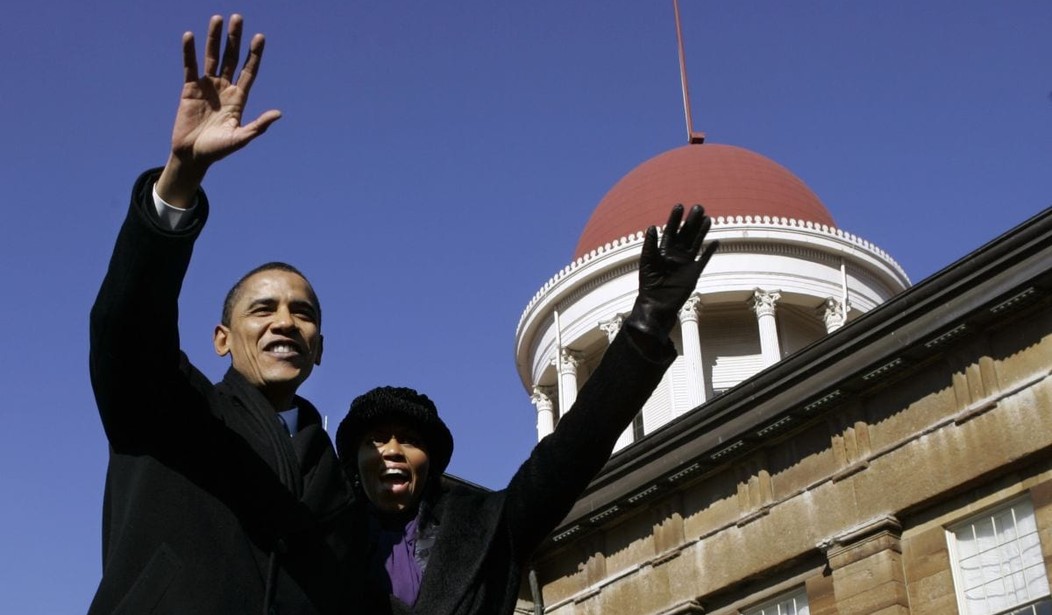President Obama will visit Springfield, IL, on Wednesday, no doubt a trip heavy with nostalgia for the man who announced his candidacy for president exactly 9 years ago on February 10, 2007.
At that time, Barack Obama spoke before thousands of supporters in the Springfield town square. Wednesday’s speech will be given before the Illinois legislature. While the distance in space between the two venues is relatively small, it is the distance in how far we’ve fallen as a nation that has become painfully clear since that crisp, cold day so many years ago.
Illinois is a state in crisis. Radical change is needed to turn the state’s fiscal and economic fortunes around. But, as Diana Sroka Rickert points out in the Chicago Tribune, that’s not going to happen as long as the cabal of career politicians and the special interests they represent hold the state government in thrall.
Every time Gov. Bruce Rauner puts forward a proposal, it is immediately stonewalled by a powerful group of Illinois politicians and special interests who view his governorship and ideas as a threat to their livelihoods. They oppose Rauner on all fronts, even if members of their own party back the ideas he’s pushing.
For example: Rauner supports redistricting reform. So does President Obama. But here in Illinois? Redistricting reform and term limits “were Republican Party campaign issues, designed to be used in Republican campaigns,” House Speaker Michael Madigan told WSIU radio last year.
Obama has called charter schools “incubators of innovation” and described them as “an important partner in widening the circle of opportunity for students who need it most.”
Rauner, too, champions charter schools. But at a City Club appearance in October, Illinois Federation of Teachers President Dan Montgomery said, “I can’t tell you one educational innovation that came from the charter movement, and that’s supposed to be the purpose of it.”
When Obama announced his bid for the White House in February 2007, he described Springfield as a place where “we learned to disagree without being disagreeable — that it’s possible to compromise.”
Today, Springfield is more accurately described as a place where “compromise” means Republicans rubber-stamping a Democrat-led proposal.
Almost every time Republicans try to put their fingerprints on an initiative, it gets shut down and tabled — and the governor labeled “extreme.”
It isn’t as if Democrats reject Republican proposals and offer their own alternative. Illinois Democrats have yet to come up with a plan that would fund the state government and balance the budget as required by law.
This malignant dysfunction has caused evil times to descend upon the state and its inhabitants. Beyond the paralysis in state government that has stretched a budget crisis from July 1, 2015, to the present day, there are tangible, measurable yardsticks that reveal a slow-motion meltdown mirrored in other states across the country.
Consider how far the state has sunk since Barack Obama announced for president in 2007:
In 2007, Illinois had $42.2 billion in the state’s unfunded pension liabilities; today that figure is north of $111 billion.
Today Illinois has almost 58,000 fewer jobs than it did in February 2007, according to the federal Bureau of Labor Statistics. Imagine how tough it is to find a job when there are fewer jobs to go around.
Blue collar, middle-class workers face particularly tough prospects. In 2007, the state had 113,000 more manufacturing jobs than it has today. A lot of these jobs have skipped the border for neighboring states. Others just flat disappeared.
What do you think it’s like when you’re middle-aged, you lose a factory job you’ve had for years and you don’t have a college degree allowing you to quickly land a cubicle in some downtown office? What do you do when the place you’ve worked for years closes down and nothing moves in to replace it?
Not even those of us lucky enough to have a job have been protected. In 2007, the median household income in Illinois was $61,797. The U.S. Census Bureau pegs the latest figure at $57,444, after adjusting for inflation.
Translation: We’re making less money than we used to make.
And that doesn’t even take into account how much more we pay in higher local, property and state taxes.
Across the country, pension and debt bombs are preparing to detonate with consequences that will rock our economy. The president will try and tout his economic record, but there is a chasm of difference between official government statistics and what’s going on in the lives of ordinary people. What some are calling the “Waiter and Bartender” jobs recovery has led to the real income of American workers falling relative to inflation. Last month, 70% of jobs created were minimum wage jobs.
This will be the reality President Obama will face as he speaks on Wednesday before a dysfunctional legislature. The nation Obama tried to transform is angry, as they have every right to be, at politicians who continue with business as usual while they struggle and suffer to eke out a living in Obama’s America.










Join the conversation as a VIP Member